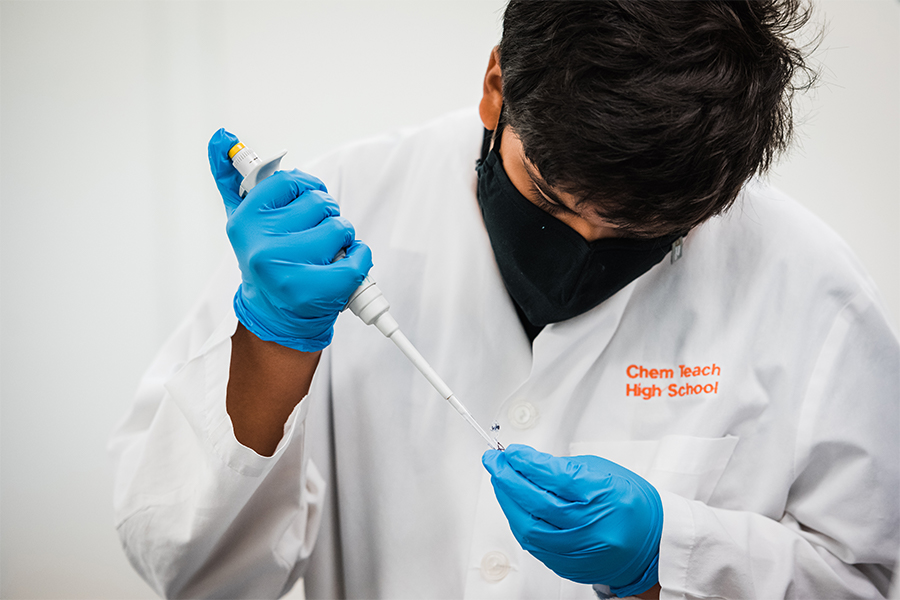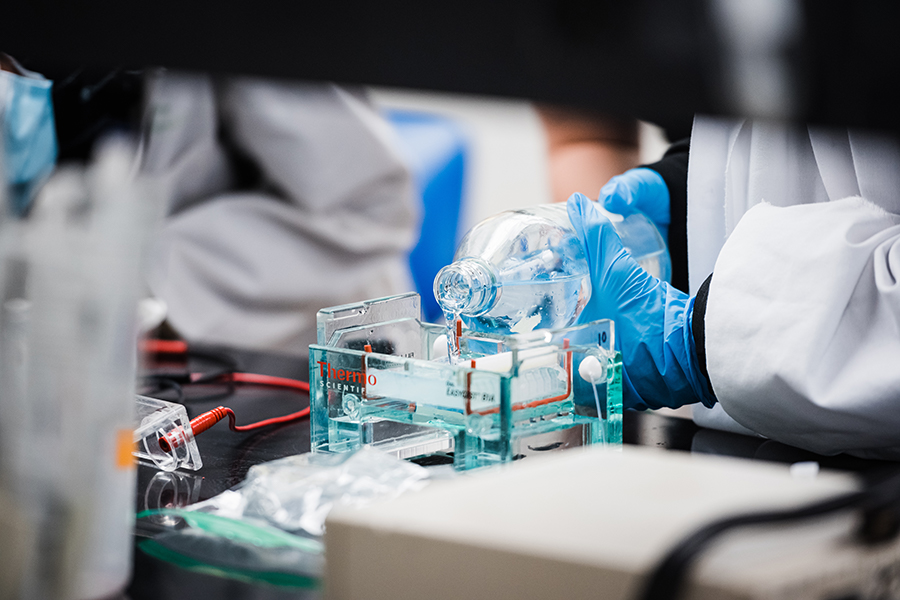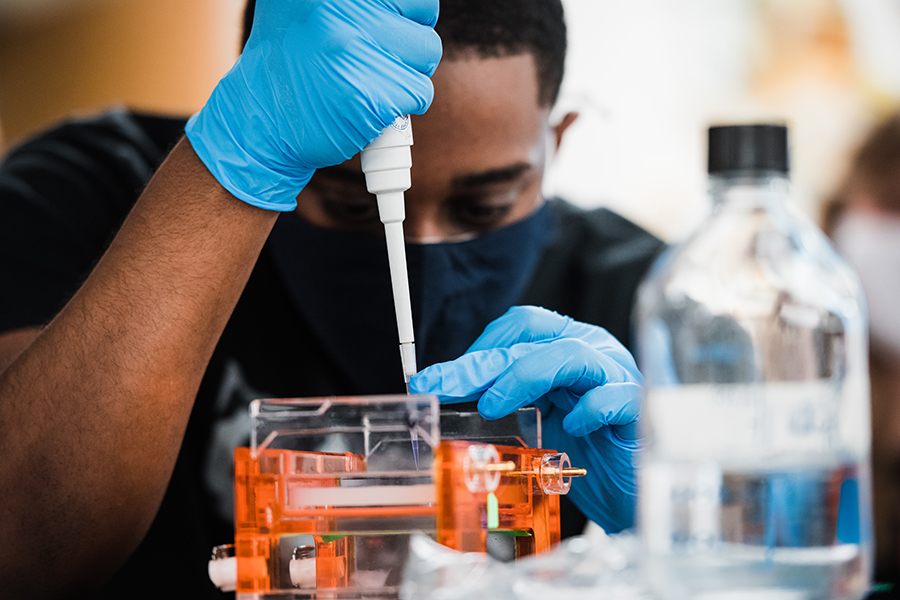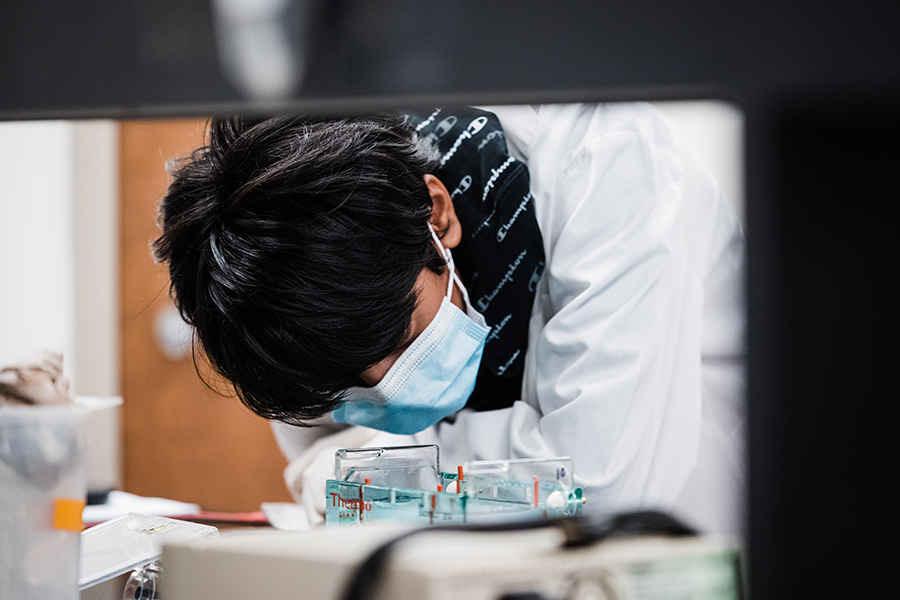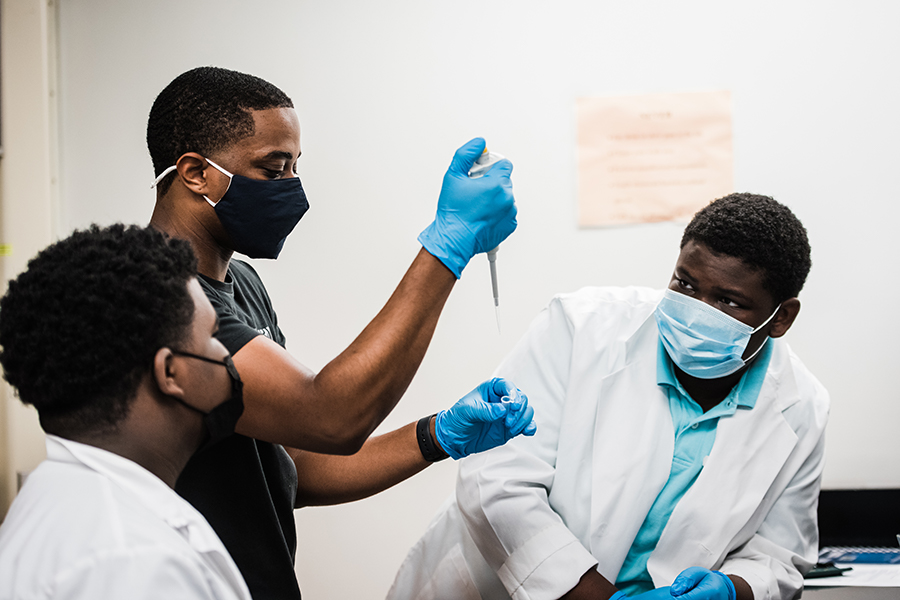Media contact: Bob Shepard
Wearing a black mask and clear wrap-around goggles, Nicholas Johnson grips the micro pipet in his blue-gloved hand, as he steadies his arm with the other. Ten pairs of eyes focus on Johnson, while he slowly presses down on the dark gray button of the syringe-like tool. Into a clear, gel-filled tray, he deposits a light purple liquid containing genetic material into the first miniature well, with eight left to go.
Observing Johnson’s process of gel electrophoresis, the pairs of eyes — belonging to Jefferson County high school students — widen in awe as the purple, negatively charged substances crawl from the well to the positively charged electrode on the opposite end of the plate, moved by an electrical current. Mask-covered students around Johnson peer into the gel, preparing to start the protocol in their groups.
Honors College students Nicholas Johnson, Rhythm Williams and Toby Liu in the Roadmap for America’s Cancer Explorers for the 21st Century program at the University of Alabama at
Birmingham are facilitators, or camp counselors, of the BioBridge program. RACE21 is a
summer cancer biology course for rising ninth graders in surrounding school systems, funded by the National Cancer Institute and directed by Michelle S. Johnson.
The UAB Summer Science Institute holds programs like BioBridge at the Center for Community Outreach Development. This summer course consists of a weeklong session for each of two different groups of rising ninth graders, including students in the Gear-Up Jefferson County program, and takes place during the last week of June and the last week of July. After a year and a half of uncertainty caused by the coronavirus pandemic, both facilitators and high schoolers returned to the UAB campus this summer.
Nicholas Johnson
As a person of color, Johnson, a junior studying neuroscience, says he understands the importance of helping those who are less fortunate than himself. Whether it is through teaching or by simply helping someone get a firmer grasp on a biological concept, he has always had a passion to learn and share ideas.
Leading the students in daily warm-up quizzes and games of Kahoot to refresh their memories, Johnson instructs the students about symptoms of cancer and metastasis, or the movement of unrestrained cell reproduction throughout the body.
“True or false: Cancer always causes DNA damage,” the student-instructor asked the 10 high-schoolers, adorned with stark white lab coats.
Without hesitation, the class pounded their smart phones and shouted “False!” Everyone was correct, that time. The participant holding first place on the scoreboard grinned through her lavender and white polka-dotted mask.
An example is lung cancer, the most common cancer, which produces symptoms of constant chest pain, wheezing and many more, Johnson says. The participants in the summer program also learn about genetic inheritance, or how one’s phenotype, like a physical trait, is determined by a genotype, or a code of chemical information. To test their knowledge, the high schoolers fill out pedigrees and Punnett squares. These tools help predict the probability of someone’s possessing certain sets of alleles, or variations of a gene.
Johnson says he was surprised and overjoyed to see the kids rapidly and confidently answer the facilitators’ questions and appreciated their engagement in the program.
“After the program, the students retain the knowledge and spread it throughout the community,” Johnson said. “By knowing the symptoms and risk factors of something like lung cancer, they could save a loved one or a close friend.”
“Watching the campers’ creative videos, as each group confidently explains the effects of UV exposure to their communities, puts a smile on my face,” Williams said. “If these students determined to excel in science end up at UAB, I’m sure they will be successful here.”
Rhythm Williams
Excited to return to the UAB campus after a year of Zoom-facilitated online courses, RACE21 counselor Williams says she anticipated teaching fundamental laboratory techniques to the new high schoolers during the BioBridge program.
Learning in a lab setting inspires younger generations to explore scientific research early in their academic journey, which is crucial in today’s competitive academic environment, says Williams, a junior studying biomedical sciences.
“This opportunity has allowed me to give back to the students in communities across Birmingham and show those living in underserved areas that they too can become neuroscientists or other specialists,” she said.
During the week of curriculum built by these Honors College members, ninth graders construct a network of contacts should they choose to pursue degrees at UAB. They learn from top experts — such as pathologists Oraline Snaith, M.D., Alison Burkett, M.D., and Caroline Stanek, M.D. — about their respective fields of science and medicine.
After the high schoolers view a slideshow of bluish-purple schwannoma, a form of nerve cell cancer, and small-cell carcinoma, a form of lung cancer, Williams encourages the students to reach out to these professionals, especially if they showed interest in these microscopic examples of cancer biology.
Not only do students learn about the various fields of study from physician-scientists, they also create educational videos using social media platforms to share their biology lessons with friends and family.
“Watching the campers’ creative videos, as each group confidently explains the effects of UV exposure to their communities, puts a smile on my face,” Williams said. “If these students determined to excel in science end up at UAB, I’m sure they will be successful here.”
Toby Liu
BioBridge presents an opportunity for public school students from each corner of Birmingham to connect and meet in-person, share ideas, and examine cancer from new perspectives, according to Liu, a junior studying cancer biology.
“Working through cancer genetics case studies helps the ninth graders think like genetic counselors, and modeling metastasis and the dynamics of the cellular landscape helps set the foundation for understanding modern cancer treatments that have saved the lives of millions,” Liu said.
Programs like BioBridge improve cancer awareness, especially in communities that have less access to public health information — a huge step to create healthier and more informed Birmingham communities.
To Liu, possessing knowledge of various cancer mutations, screening options, statistics and prevention measures empowers students to play a role in the war against cancer.
When the ninth graders asked him tough questions about the production of certain cellular proteins, for example, it challenged him to be a more effective teacher, Liu says.
“Watching these students micro-pipet dilutions into PCR plates to visualize the effects of UV damage reminded me of my first days in the lab,” Liu said. “These students absolutely inspire me, and I believe that, together, we can achieve new heights in STEM fields with this particularly bright generation of scholars.”
